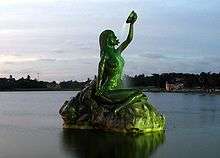Iracema
 Statue in honor of Iracema in Fortaleza | |
| Author | José de Alencar |
|---|---|
| Original title |
Iracema Iracema - A Lenda do Ceará |
| Translator | Lady Isabel Burton |
| Country | Brazil |
| Language | Portuguese |
| Series | Alencar's indigenist novels |
| Genre | Romance novel |
| Publisher | B. L. Garnier |
Publication date | 1865 |
Published in English | 1886 |
| ISBN |
978-0-85051-500-8 ISBN 978-0-85051-524-4 (English) |
| Preceded by | O Guarany |
| Followed by | Ubirajara |
Iracema (in portuguese: Iracema - A Lenda do Ceará) is one of the three indigenous novels by José de Alencar. It was first published in 1865. The novel has been adapted into films twice in 1917 as a silent film and in 1949 as a sound film.
Plot introduction
The story revolves around the relationship between the Tabajara indigenous woman, Iracema, and the Portuguese colonist, Martim, who was allied with the Tabajara nation's enemies, the Pitiguaras.
Through the novel, Alencar tries to remake the history of the Brazilian colonial state of Ceará, with Moacir, the son of Iracema and Martim, as the first true Brazilian in Ceará. This pure Brazilian is born from the love of the natural, innocence (Iracema), culture and knowledge (Martim), and also represents the mixture (miscegenation) of the native race with the European race to produce a new (Brazilian) race.
Explanation of the novel's title
Iracema is Guarani language for honey-lips, from ira - honey, and tembe - lips. Tembe changed to ceme, as in the word ceme iba, according to the author.
"Iracema" is also an anagram of "America", appointed by critics as befitting the allegorization of colonization of America by Europeans, the novel's main theme.
Characters in Iracema
- Andira: Araquém's brother. Old warrior and hero of his people.
- Araquém: Iracema's father. Spiritual leader of the Tabajara's nation.
- Batuireté: Poti's grandfather
- Caubi: Iracema's brother
- Iracema: Araquém's daughter. She is the beautiful Tabajara woman with honey-lips and dark hair.
- Irapuã: The warrior leader of the Tabajara nation.
- Jacaúna: Poti's brother.
- Jatobá: Poti's father. He is an important veteran warrior of the Pitiguara's nation.
- Martim: Portuguese colonist. Named in honor of Mars, the Roman god of war.
- Moacir: The child of Martim and Iracema.
- Poti: Martim's friend and the Pitiguara warrior who is brother of the Pitiguara leader.
Iracema and the Indianist Novels
Iracema, along with the novels O Guarani and Ubirajara, portrays one of the stages of the formation of the Brazilian ethnic and cultural heritage. Iracema symbolizes the initial meeting between the white man (Europeans) and the natives. "Moacir" means "Son of Pain", which is related to his birth, alone with his mother who was abandoned by Martim for some time when he had to go and help the Potiguaras in a tribal war against the Tabajaras.
Awards and nominations
.jpg)
- There is a Brazilian stamp in honor of Iracema's centennial (1865/1965) and its author.
- There is a Brazilian painting by Antônio Parreiras.
- Iracema is cited in Manifesto Antropófago (Cannibal Manifesto), which is published in 1928 by Oswald de Andrade
References
- Alencar, José de. Iracema (1865) Rio de Janeiro: B. L. Garnier. (in Portuguese) ISBN 0-85051-500-9
- Alencar, José de. Iracema, the honey lips: a legend of Brasil (1886) translated by Lady Isabel Burton. London: Bickers & Son. ISBN 0-85051-524-6
- Alencar, José de. Iracema (2000) translated by Clifford Landers. New York: Oxford University Press. ISBN 0-19-511547-3
- Burns, E. Bradford. A Working Bibliography for the Study of Brazilian History The Americas, Vol. 22, No. 1 (Jul., 1965), pp. 54–88
External links
| Portuguese Wikisource has original text related to this article: |
| Wikimedia Commons has media related to Iracema. |
- (Portuguese) Academia Brasileira de Letras
- (Portuguese) Brazilian literature
- (English) Iracema, The Honey-lips - A legend of Brazil. (translated by Richard F. and Isabel Burton.)
-
 Iracema public domain audiobook at LibriVox
Iracema public domain audiobook at LibriVox